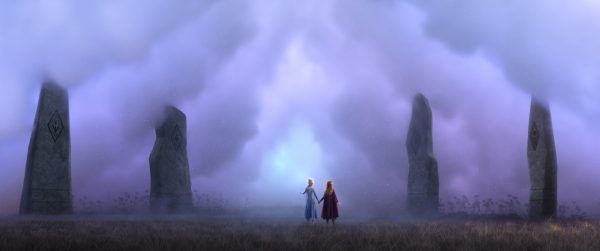Spoilers ahead for Frozen II.
Thematically, Frozen II has a really interesting subtext about what we owe to other people based on the sins of past generations. In the movie, we learn that an alliance between Arendelle and the Northuldra was violated when Elsa and Anna’s grandfather, the former king, tricked the Northuldra into using a dam and then killed their leader without provocation. This attempt at conquest was thwarted when the spirits of the forest trapped everyone inside with a magical mist. It became a piece of forgotten history until Elsa works to uncover what really happened. In order to restore peace and break the spell, the dam must be destroyed, but destroying the dam will also flood Arendelle. Should the people of Arendelle, who are not directly responsible for the actions of their ancestors, suffer the consequences?
That’s a good question and one that goes to the heart of reparations and atoning for the past. Unfortunately, Frozen IIabsolutely bails at the last moment when Elsa uses her magic powers to save Arendelle from being flooded. The dam breaks, the spell is broken, and everyone is saved and happy. Elsa gets to rule Northuldra and Anna now rules Arendelle. It’s a “happy” ending.
Except not really. Disney has shown a willingness to dive into some tough subject matter recently that has no easy answers. Ralph Breaks the Internet is about toxic masculinity and creating co-dependent relationship regardless of another person’s wishes. Big Hero 6 is about how easily grief can turn into rage and violence. Zootopia is about racial conflict and stereotyping. These movies also have happy endings, but they don’t shy away from the difficulty of the subtext. But Frozen II raises a question it has no interest in answering. It doesn’t want to follow the subtext to its natural conclusion, and it’s a conclusion that’s incredibly important in today’s world.
But because it might bum the audience out if the people of Arendelle lost their homes and had to rebuild, you have Elsa’s magic saving the day, which is just a massive cop-out to the hard conversation the movie sets up. If the conflict is about wrestling with the sins of the past, then to have the solution literally be magic is anticlimactic and would really only work if Frozen II were satirical. The movie is not satirical.
I get that Frozen II is a family film, but would people really be devastated if Arendelle had to be rebuilt? It is not the most outlandish thing to say, “We were not personally responsible for these problems, but we must deal with their fallout all the same.” Rebuilding and reckoning with the past are tough, and Frozen II doesn’t really know how to follow through on that so Elsa rides a magic water horse and uses her ice magic to save the day. Nothing is really solved, but catastrophe is avoided in a way that feels unearned. The only work that had to be done was exposing the truth and destroying a dam, not dealing with the fallout.


